|
|
|
Sort Order |
|
|
|
Items / Page
|
|
|
|
|
|
|
| Srl | Item |
| 1 |
ID:
151407
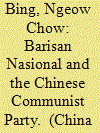

|
|
|
|
|
| Summary/Abstract |
As Malaysia and China have become “comprehensive strategic partners”
since 2013, the bilateral relations of these two countries have been
getting stronger. However, party-to-party relations between the two
countries have not received much scholarly attention. This article
discusses the Chinese Communist Party’s (CCP) interactions with the
Barisan Nasional (BN) coalition and its main component parties,
United Malays National Organization (UMNO) and Malaysian Chinese
Association (MCA) in Malaysia. It discusses the origins of China’s
party-based diplomacy, the actual development in this area of diplomacy
between Malaysia and China, and the implications of this kind of
party-based diplomacy. It suggests that one of the main activities
carried out under party-based diplomacy is for CCP to offer its
governing lessons to other ruling parties, which has not been discussed
much by other analysts of China’s party-based diplomacy
|
|
|
|
|
|
|
|
|
|
|
|
|
|
|
|
| 2 |
ID:
140278
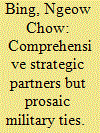

|
|
|
|
|
| Summary/Abstract |
Malaysia and China upgraded their relationship to a Comprehensive Strategic Partnership in 2013 and signed a Joint Communique in 2014. Although the Comprehensive Strategic Partnership includes a pledge to strengthen cooperation between the armed forces of the two countries, so far, however, Sino–Malaysian defence ties have advanced only incrementally. This article focuses on the development of defence relations between the two countries from 1991 until the first half of 2015. It examines several areas of defence diplomacy, including visits by senior officials, the exchange of military students, arms sales, defence and security consultations and combined military exercises. It concludes that although Malaysia–China defence ties have not developed as quickly as other aspects of the bilateral relationship, this does not mean that the Comprehensive Strategic Partnership lacks depth, or that Kuala Lumpur fundamentally distrusts Beijing because of recent developments in the South China Sea.
|
|
|
|
|
|
|
|
|
|
|
|
|
|
|
|
| 3 |
ID:
136435
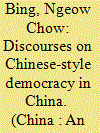

|
|
|
|
|
| Summary/Abstract |
This article reviews a book series on Chinese-style democracy that was published in China in 2010 and represents mainstream Chinese perspectives and discourse on Chinese-style democracy. It begins with a discussion of whether a viable alternative to the liberal democratic model exists, and whether we should seriously consider Chinese-style democracy as one such alternative. The article discusses each of the volumes in this series, evaluates the arguments contained within them, and then reviews another two books in English that critique Chinese-style democracy. Finally, it concludes by arguing that we should take Chinese discourse about Chinese-style democracy seriously, not because we have to agree that it presents a viable alternative, but because it provides a realistic strategy for political progress within China’s political system.
|
|
|
|
|
|
|
|
|
|
|
|
|
|
|
|
| 4 |
ID:
137504
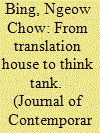

|
|
|
|
|
| Summary/Abstract |
The Central Compilation and Translation Bureau (CCTB), a key research organ of the Chinese Communist Party, has received little attention from scholars inside or outside of China. Originally an authoritative translation house for classical Marxist works, in recent years CCTB has gained more prominence as a policy think tank. Among its leaders are well-known advocates for political reforms and democracy. This article examines the institutional evolution of CCTB. It will discuss what factors are involved in how CCTB has evolved, including the role of its leadership and the changing political context in China; and it will examine how CCTB reconciles its seemingly contradictory roles of being a Marxist translation house and a pro-reform think tank.
|
|
|
|
|
|
|
|
|
|
|
|
|
|
|
|
| 5 |
ID:
183135
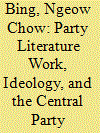

|
|
|
|
|
| Summary/Abstract |
This article reviews the origins, development and current trends of what is known as ‘party literature work’ and the principal organisation that carries out this work—the Central Party Literature Office (CPLO). Party literature work plays a crucial role for each generation of Chinese communist leadership to assert its ideological ‘line’ and build its canon. It is an integral part of the ideological apparatus of the Communist Party of China. Under Xi Jinping, CPLO was merged into a new organisation, but party literature work remains and continues to play a key role, supporting his ideological line.
|
|
|
|
|
|
|
|
|
|
|
|
|
|
|
|
| 6 |
ID:
116638
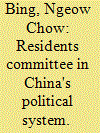

|
|
|
|
|
| Publication |
2012.
|
| Summary/Abstract |
The residents' committee is the lowest level of the administrative hierarchy in China's cities, but it is also an important part of the political system. Under the rubric of community construction and grassroots democracy, residents' committees are undergoing certain democratic reforms such as improved procedures for elections and a more open and participatory governance process. At the same time, they are also important resources for the regime in terms of consolidating support and control, especially where maintenance of stability and mass mobilization are concerned. This paper analyzes the multifaceted nature of the residents' committee and its importance in China's political system.
|
|
|
|
|
|
|
|
|
|
|
|
|
|
|
|
|
|
|
|
|